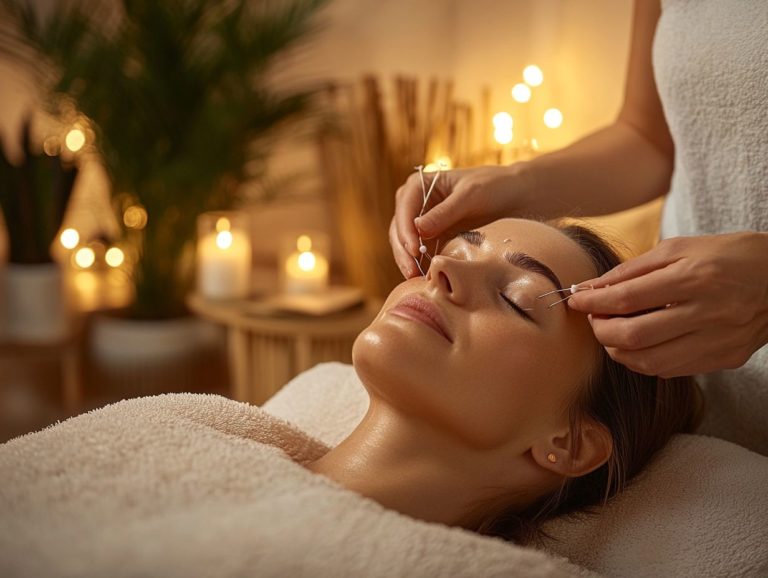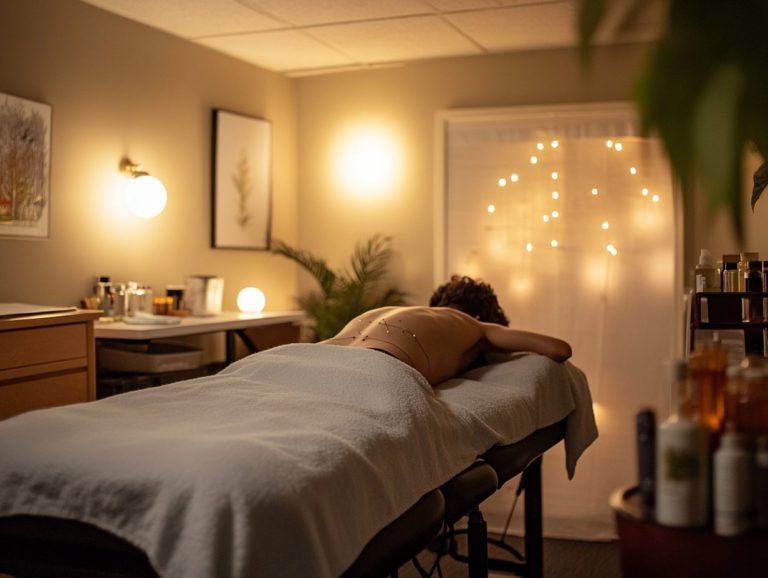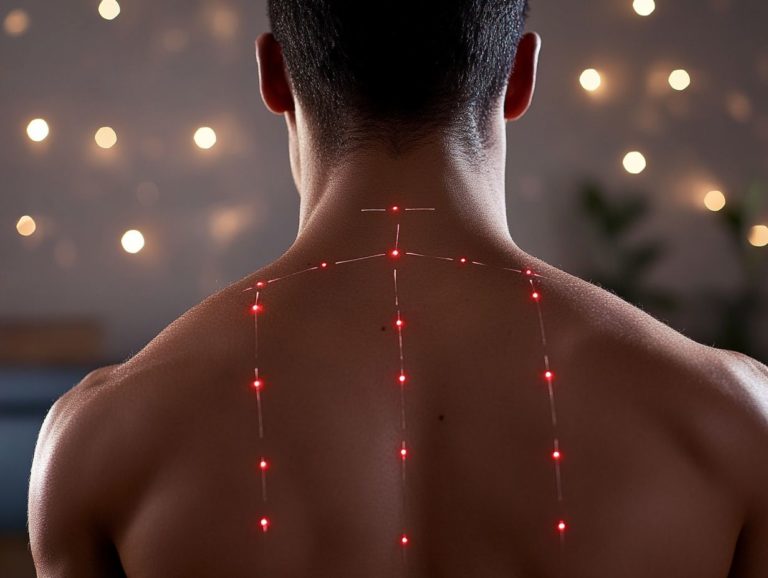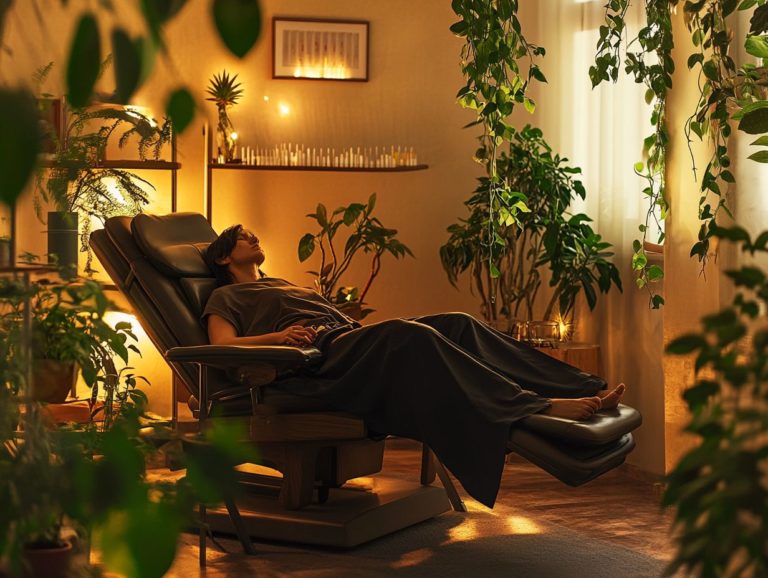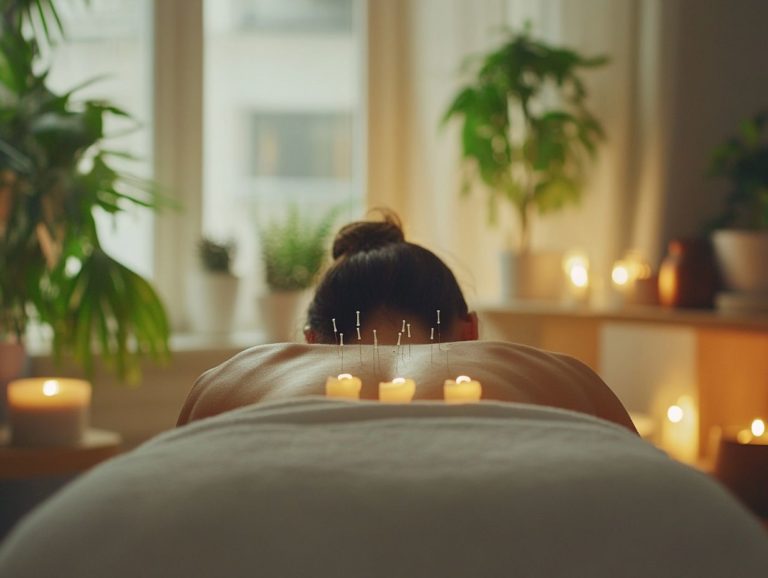The Impact of Acupuncture on Sleep Disorders
Sleep disorders can profoundly impact your daily life, influencing everything from your mood to your overall well-being. With various types and underlying causes, discovering effective treatment is crucial.
This article delves into the role of Traditional Chinese Medicine (TCM) and acupuncture in addressing these challenges. It examines the mechanisms of acupuncture, reviews research findings, and outlines what you can expect during a session.
It also explores how acupuncture can be integrated with other therapies, offering a holistic approach to enhancing your sleep quality.
Contents
- Key Takeaways:
- Understanding Sleep Disorders
- Traditional Chinese Medicine and Acupuncture
- The Role of Acupuncture in Improving Sleep
- Research Studies on Acupuncture and Sleep
- Preparing for an Acupuncture Session
- Combining Acupuncture with Other Treatments
- Frequently Asked Questions
- What is acupuncture and how does it relate to sleep disorders?
- How does acupuncture help with sleep disorders?
- Is acupuncture a safe treatment for sleep disorders?
- Are there any side effects of acupuncture for sleep disorders?
- How many acupuncture sessions are needed to see results for sleep disorders?
- Can acupuncture be used as a standalone treatment for sleep disorders?
Key Takeaways:
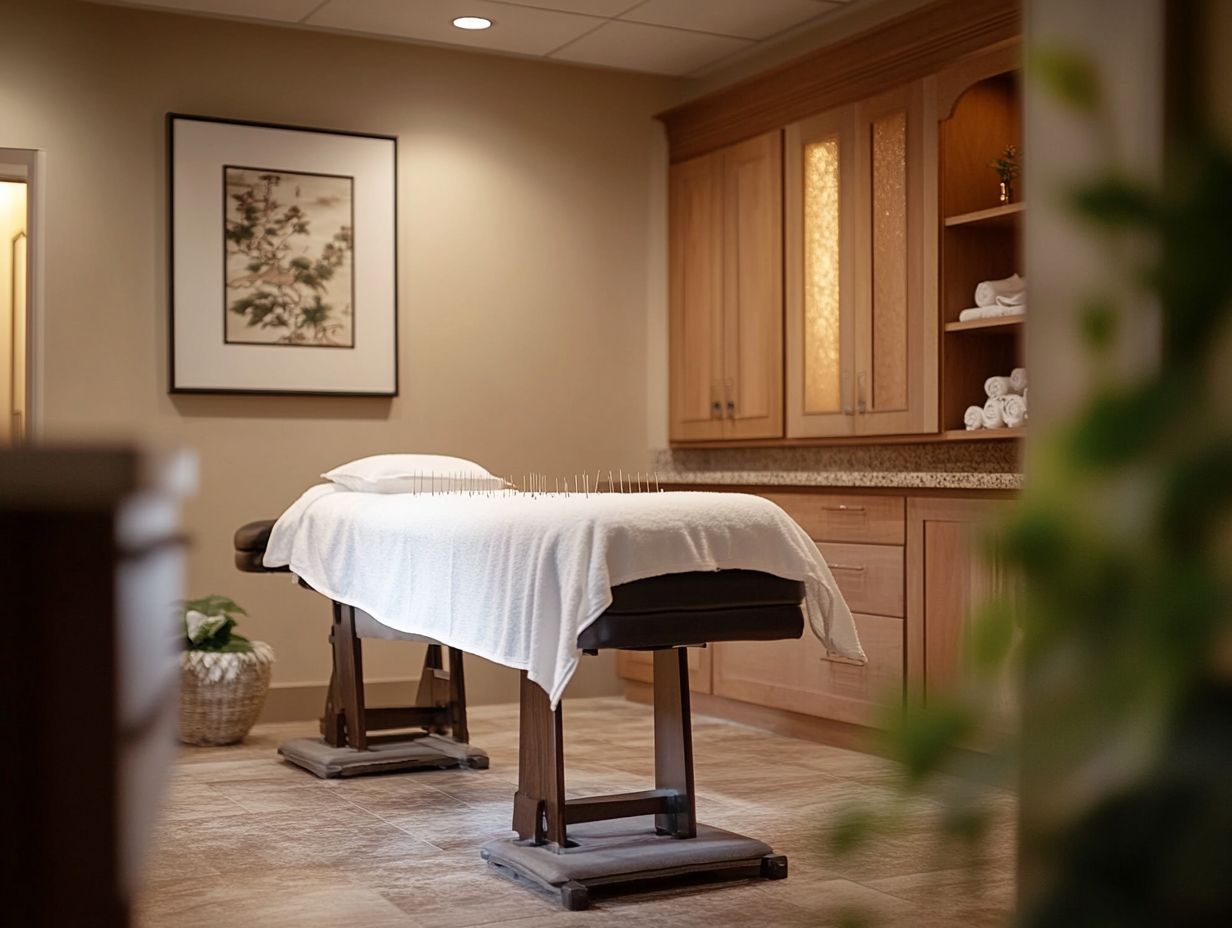
Acupuncture is a form of TCM that focuses on balancing the body’s energy flow to improve overall health. Research has shown it can be an effective treatment for sleep disorders by reducing stress, promoting relaxation, and balancing hormones. In combination with other therapies, such as herbal medicine and cognitive behavioral therapy, acupuncture provides a holistic approach to addressing sleep disorders.
Understanding Sleep Disorders
Understanding sleep disorders is essential for improving the quality of life for millions around the world. These disorders cover a range of conditions that disrupt normal sleep patterns, such as insomnia, sleep apnea, and chronic pain, leading to significant repercussions for mental health.
Symptoms vary greatly from person to person, often with anxiety and depression lurking beneath the surface. Tackling these concerns with effective treatments can dramatically improve sleep quality, boosting overall wellness and vitality.
This overview delves into the different types of sleep disorders, their causes, and their health implications.
Types and Causes of Sleep Disorders
There are various types of sleep disorders, each with its own distinct characteristics and symptoms. These can significantly impact both the duration and quality of your sleep.
Among these, insomnia is notable as it disrupts your ability to fall asleep or stay asleep. It often leaves you feeling fatigued and irritable throughout the day.
Conversely, sleep apnea involves interrupted breathing during sleep and may lead to serious health complications if left untreated, including cardiovascular issues. Each of these conditions has specific underlying causes.
For example, anxiety or stress may play a role in insomnia, while obesity and age are key risk factors for sleep apnea. The effects of these disturbances reach far beyond simple tiredness; they can influence your cognitive function, emotional well-being, and overall productivity.
Traditional Chinese Medicine and Acupuncture
Traditional Chinese Medicine (TCM) presents a comprehensive approach to health, focusing on the balance of energy flow throughout your body via meridians. Acupuncture is an exciting and powerful tool that can transform your health.
Utilizing the precise insertion of needles at specific points, acupuncture aims to restore harmony and enhance overall wellness. By targeting the root causes of various health issues, TCM opens alternative pathways for those grappling with conditions such as insomnia, anxiety, and chronic pain.
If you’re contemplating acupuncture as a therapeutic option, understanding the fundamental principles behind it is essential to appreciate its potential benefits.
Overview of Acupuncture and its Principles
Acupuncture is a cornerstone of TCM, founded on stimulating specific acupuncture points to influence the flow of energy, or Qi, which is the life force that flows through the body. This ancient practice, with roots stretching back thousands of years, hinges on the belief that true health is achieved through a delicate balance of yin and yang.
By inserting thin needles into chosen points along your meridian pathways, practitioners aim to unblock stagnant energy and restore harmonious flow. The methodology emphasizes not only the precise location of each acupuncture point but also the depth and angle at which the needles are inserted, tailored specifically to your unique condition.
This technique has earned recognition for its efficacy in addressing a broad spectrum of health concerns, including chronic pain, digestive disorders, and stress-related ailments. This makes it an exceptionally versatile option within holistic health.
Discover the amazing benefits of acupuncture today!
The Role of Acupuncture in Improving Sleep
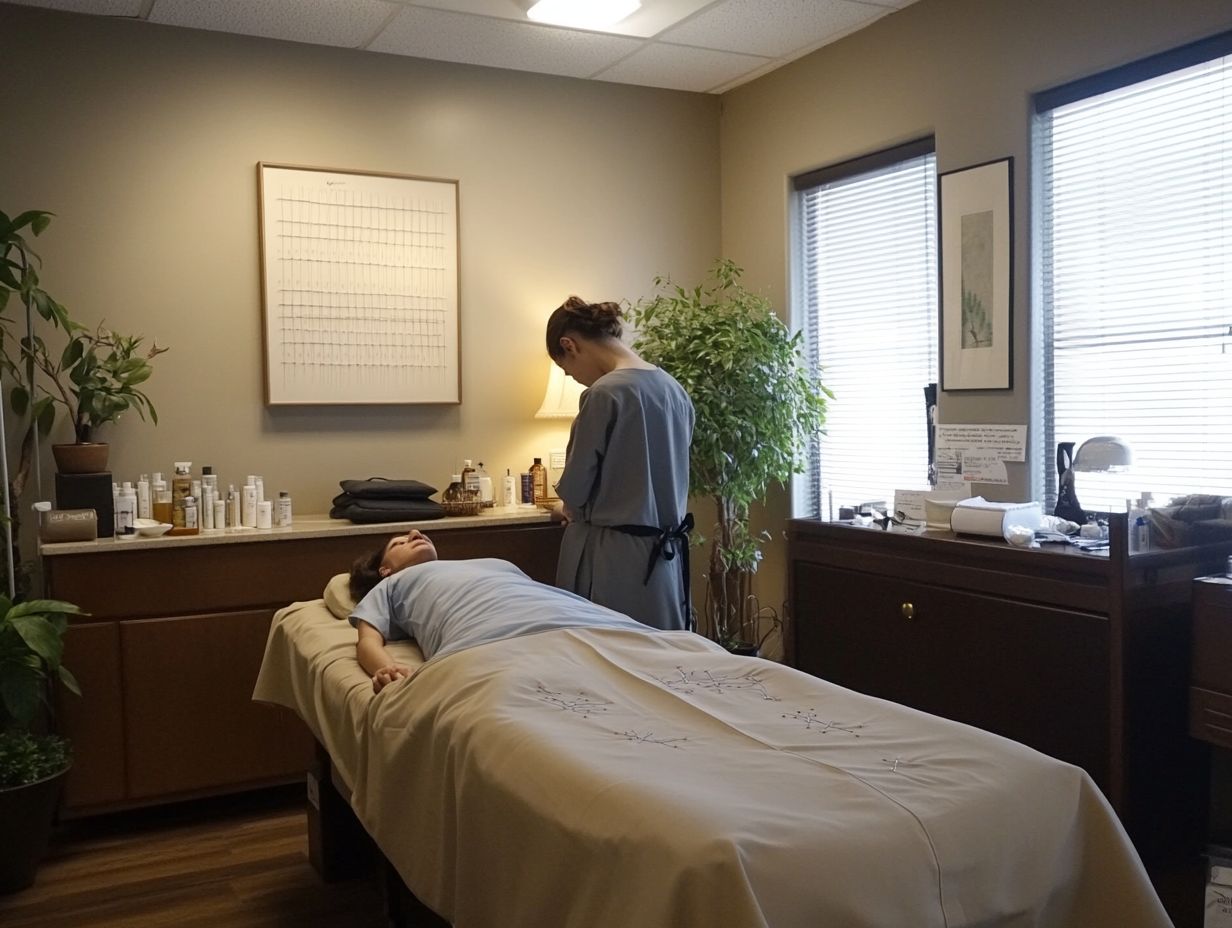
Acupuncture holds a remarkable position in enhancing sleep quality, especially for those struggling with insomnia and related disorders.
By focusing on specific acupuncture points, this holistic method addresses common issues such as anxiety, chronic pain, and stress culprits that disrupt restful slumber.
The therapeutic advantages of acupuncture are well-documented in numerous clinical studies, highlighting its efficacy as an alternative treatment for improving both sleep duration and quality.
Understanding how acupuncture can elevate your sleep experience is essential for anyone considering natural remedies for their sleep challenges.
How Acupuncture Can Address Sleep Disorders
Acupuncture can be a powerful ally in addressing various sleep disorders by targeting their root causes, providing you with a natural solution for conditions such as insomnia and chronic pain.
This ancient practice works by stimulating specific acupuncture points that enhance relaxation and promote restorative sleep. For example, points like Shen Men and An Mian are renowned for their calming effects. They help to soothe your mind and lower anxiety levels.
Techniques such as gentle needling and moxibustion a technique that uses heat to stimulate acupuncture points further aid in balancing energy flow throughout your body, which is vital for mental health.
Acupuncture alleviates insomnia and addresses chronic pain that disrupts sleep. This creates a comprehensive therapeutic approach that nurtures your overall health.
Research Studies on Acupuncture and Sleep
Research studies on acupuncture and sleep have garnered significant attention lately, showcasing its potential as a compelling treatment for insomnia and various sleep disorders.
Findings and Limitations
The findings from various clinical studies on acupuncture present promising insights into its potential for enhancing sleep quality and alleviating insomnia symptoms. Researchers have observed that acupuncture may effectively regulate sleep patterns and reduce anxiety, which often plays a significant role in sleepless nights.
For example, a meta-analysis demonstrated significant improvements in sleep quality among participants who underwent acupuncture compared to those in control groups.
Recognizing the limitations of these studies is crucial, such as small sample sizes and reliance on self-reported data, which can introduce biases. While the evidence points to acupuncture’s effectiveness, challenges persist in standardizing treatment protocols and comprehending the underlying mechanisms, highlighting the necessity for further exploration within an evidence-based medicine framework.
Preparing for an Acupuncture Session
Preparing for your acupuncture session means setting the stage for a truly comfortable and effective experience. It’s crucial to understand what to expect and to choose qualified practitioners who adhere to U.S. regulations.
During your session, the acupuncturist will assess your individual needs, tailoring the treatment specifically to the health conditions you wish to address. This thoughtful preparation can greatly enhance your overall experience and maximize the therapeutic benefits of acupuncture, making it especially important for those visiting for the first time.
What to Expect and How to Prepare
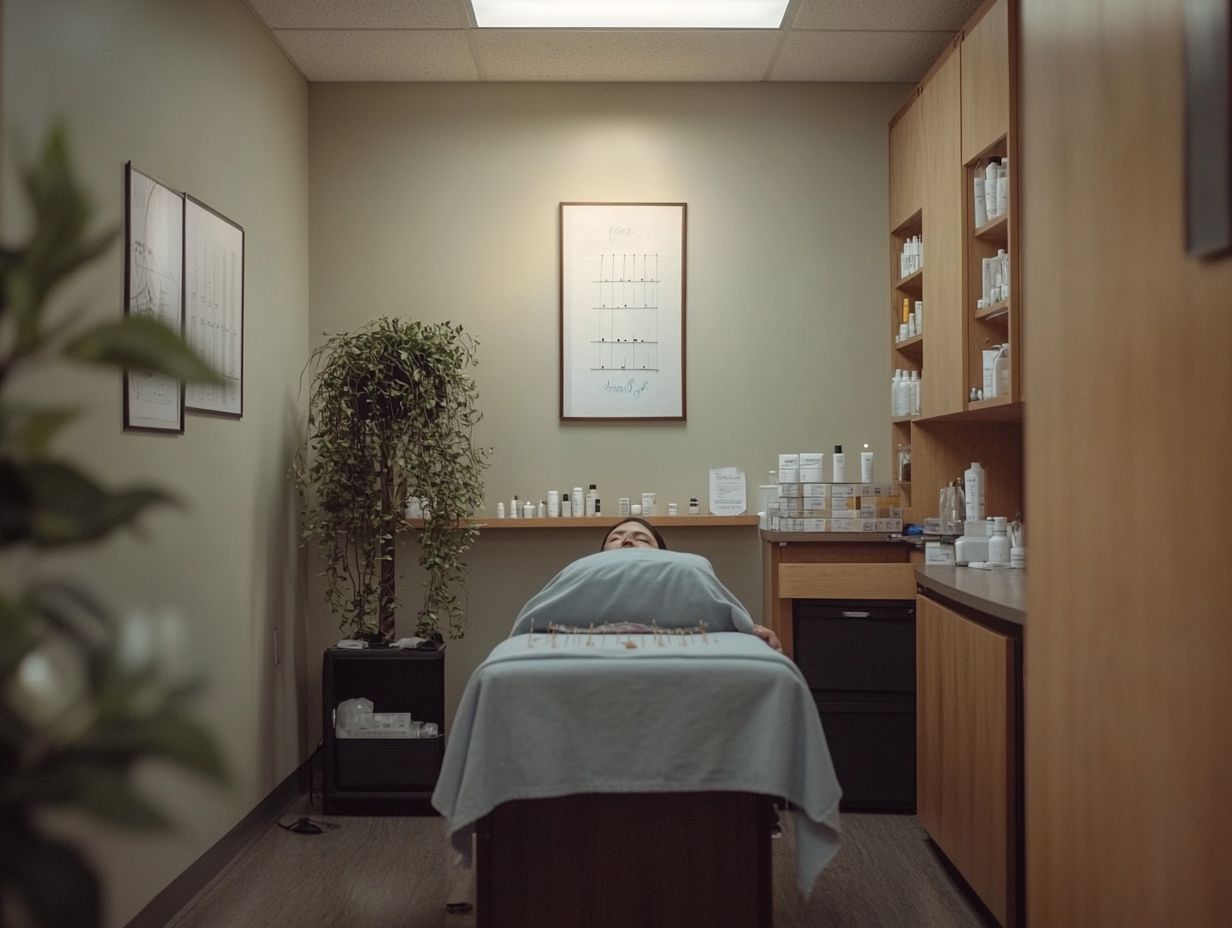
Expectations for an acupuncture session can vary widely, but understanding the process can significantly ease any concerns you might have. By familiarizing yourself with the typical flow of a session, you can approach your treatment with newfound confidence.
It usually kicks off with a consultation, where the practitioner reviews your health history, addresses your specific concerns, and discusses your treatment goals. Once that s settled, you can comfortably lie down while the acupuncturist skillfully inserts fine needles at targeted points on your body.
It s essential to prepare both mentally and physically: arrive hydrated, wear loose-fitting clothing, and maintain an open mindset.
The practitioner plays a crucial role in creating a calming atmosphere, guiding you through the experience to ensure you relax and reap the maximum benefits.
With the right preparation, you can genuinely look forward to a rejuvenating session.
Key Benefits of Acupuncture for Sleep
- Enhances relaxation and promotes restorative sleep.
- Addresses root causes of insomnia and chronic pain.
- Regulates sleep patterns and reduces anxiety.
Don’t miss out on this natural remedy to improve your sleep quality! Book your acupuncture session today.
Combining Acupuncture with Other Treatments
By integrating acupuncture with other treatments, you can enhance its effectiveness and craft a holistic approach to your health and wellness.
This synergy deepens the benefits of acupuncture and fosters a more rounded path to overall well-being.
Complementary Therapies and Approaches
Complementary therapies, such as cognitive behavioral therapy and herbal therapy, can significantly enhance acupuncture’s effectiveness in managing sleep disorders. These therapies address both the mental and physical aspects of sleep disturbances, offering a more holistic treatment plan.
Cognitive behavioral therapy provides strategies to tackle anxiety and negative thought patterns, which often contribute to insomnia. Meanwhile, herbal therapy introduces natural calming ingredients like chamomile and valerian root, working in harmony with acupuncture to promote relaxation and restorative sleep.
These approaches elevate your sleep quality and support your overall well-being, making them essential components of a comprehensive health strategy designed to combat sleep issues.
Frequently Asked Questions
What is acupuncture and how does it relate to sleep disorders?
Acupuncture is a traditional Chinese medicine practice involving the insertion of thin needles into specific points on the body. This stimulates healing and promotes overall well-being. It has been effective in treating various sleep disorders such as insomnia, sleep apnea, and restless leg syndrome.
How does acupuncture help with sleep disorders?

Acupuncture helps regulate the body’s natural energy flow and promote relaxation. It can also alleviate pain and reduce stress and anxiety, common causes of sleep problems.
Is acupuncture a safe treatment for sleep disorders?
Yes, acupuncture is generally considered a safe treatment for sleep disorders when performed by a licensed and trained practitioner. The use of sterile needles and proper techniques significantly reduces the risk of adverse effects.
Are there any side effects of acupuncture for sleep disorders?
The most common side effect is mild bruising or soreness at the needle insertion site, which typically resolves within a day or two. Some individuals may experience temporary lightheadedness or dizziness, but these effects are rare and not serious.
How many acupuncture sessions are needed to see results for sleep disorders?
The number of acupuncture sessions needed can vary depending on the individual and the severity of their condition. On average, it is recommended to have 2-3 sessions per week for 4-6 weeks to see significant improvement in sleep quality.
Can acupuncture be used as a standalone treatment for sleep disorders?
While acupuncture is effective for sleep disorders, it is often used as a complementary treatment alongside other therapies such as medication, therapy, and lifestyle changes. Consult your healthcare provider to determine the best course of treatment for your specific sleep disorder.
Discover how acupuncture can transform your sleep! Consult your healthcare provider today to discuss acupuncture.

